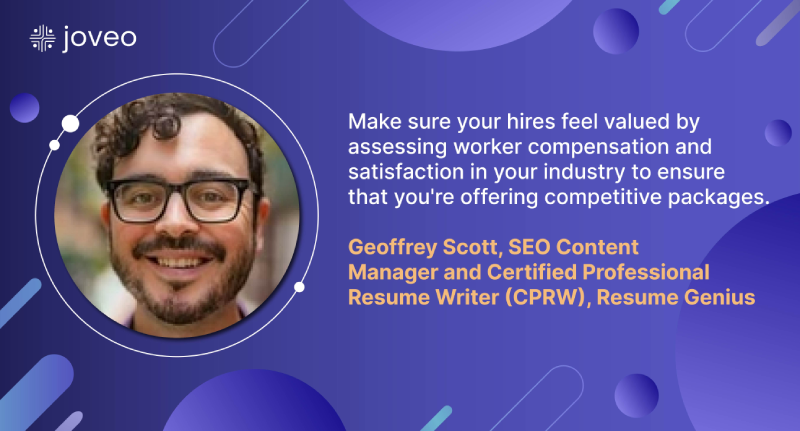In today’s global economy, recruiting top talent comes with its own set of unique opportunities and challenges. We’ve gathered insights from six leaders, including co-founders, CEOs, and directors, to help you navigate this complex landscape. From combatting employee fatigue to enhancing the candidate experience and mastering employee retention, discover the key strategies these experts recommend for recruiting great-fit talent in a global market.
Combat Employee Fatigue
Employee fatigue is a definite challenge. Since the middle of last year, workers have been quitting their jobs in droves, spurred on by rising inflation, the Great Return (to the office), and a loss of trust in employers.
We’re also experiencing a talent-saturated job market, and many hiring managers are offering job applicants less while also becoming complacent about their existing talent.
Don’t be one of those hiring managers.
The economy may stabilize, but employee fatigue won’t evaporate when it does. Make sure your hires feel valued by assessing worker compensation and satisfaction in your industry to ensure that you’re offering competitive packages.
And do so without losing sight of your current employees.
A common hiring manager mistake is to let compensation for new hires outpace compensation for existing employees — which kills talent retention. You don’t want to lose your top performers as soon as another opportunity presents itself.
Geoffrey Scott, SEO Content Manager and Certified Professional Resume Writer (CPRW), Resume Genius

Overcome Language Barriers
One challenge that companies face when recruiting great-fit talent in a global economy is overcoming the language barriers that exist between different countries and regions. Companies need to ensure that they can effectively communicate with potential candidates, both during the recruiting process and after hiring.
It is important to have a team of recruiters who are fluent in multiple languages to help with communication during the hiring process.
Span Chen, Growth Director, Notta
Leverage the Global Talent Pool
One of the greatest opportunities I must navigate is leveraging the global economy to recruit individuals with a range of international experience and diverse cultural backgrounds. Being able to source talent from around the world opens up countless possibilities, allowing me to find top-notch candidates who can bring a unique perspective and set of experiences to my team.
Yet, there are also challenges associated with this type of recruiting strategy. One is understanding different cultures and labor laws across multiple countries. This means I need to be well-versed in how laws in each country affect potential hires from those nations and how any differences may impact our internal processes or training procedures.
But when done correctly, recruiting globally can bring immense benefits to businesses like ours by providing valuable insights into foreign markets and trends, which is incredibly valuable.
Maria Harutyunyan, Co-founder, Loopex Digital
Manage Cultural Differences
With globalization, businesses have the opportunity to tap into talent from different countries and cultures, bringing a range of perspectives and skills to the table. This diversity can lead to innovation and fresh ideas within the organization.
However, navigating this global talent pool also poses challenges. One major challenge is managing cultural differences and ensuring effective communication and collaboration among team members from different backgrounds. Understanding cultural nuances, adapting management styles, and fostering an inclusive work environment are crucial.
Legal and logistical challenges may arise when recruiting talent from overseas. Employers need to navigate immigration processes, work permits, and compliance with local labor laws. This requires a thorough understanding of international employment regulations and may involve additional costs and complexities.
Luke Lee, CEO, Ever Wallpaper

Proactively Address Slow Hiring
I’m currently struggling to hire quality talent quickly. It takes around 30 to 40 days for me to find the right fit. During this time, other employees must temporarily fill vacant roles, which hurts productivity and delays projects.
That’s why I’m focusing on being proactive. I’m building relationships with passive candidates and specialist recruiters. I’m also investing in AI software to speed up the application process.
Scott Lieberman, Owner, Touchdown Money
Enhance the Candidate Experience
Candidates’ expectations have changed significantly over the years; they expect their recruitment process to be efficient and transparent—and when it’s not, they’ll simply go elsewhere.
This is especially true in the case of star talents, who are most likely being sought out by multiple employers. One way to improve the candidate experience is to have an automated application process that keeps applicants updated on their status and provides feedback quickly—this eliminates the potential for frustration and keeps them engaged throughout the process.
At the same time, recruiters should provide a personal touch by proactively reaching out to great-fit candidates directly with tailored messages that highlight the value of your organization. This helps them build positive relationships with strong talent even before they apply, creating an environment where they feel more likely to accept an offer, should one be extended.
Darren Shafae, Founder, ResumeBlaze
Joveo can help you get started with finding the right talent at the time, place, and cost. Request a demo of Joveo solutions today! And follow us on Twitter and LinkedIn for access to insightful, thought-provoking content.















